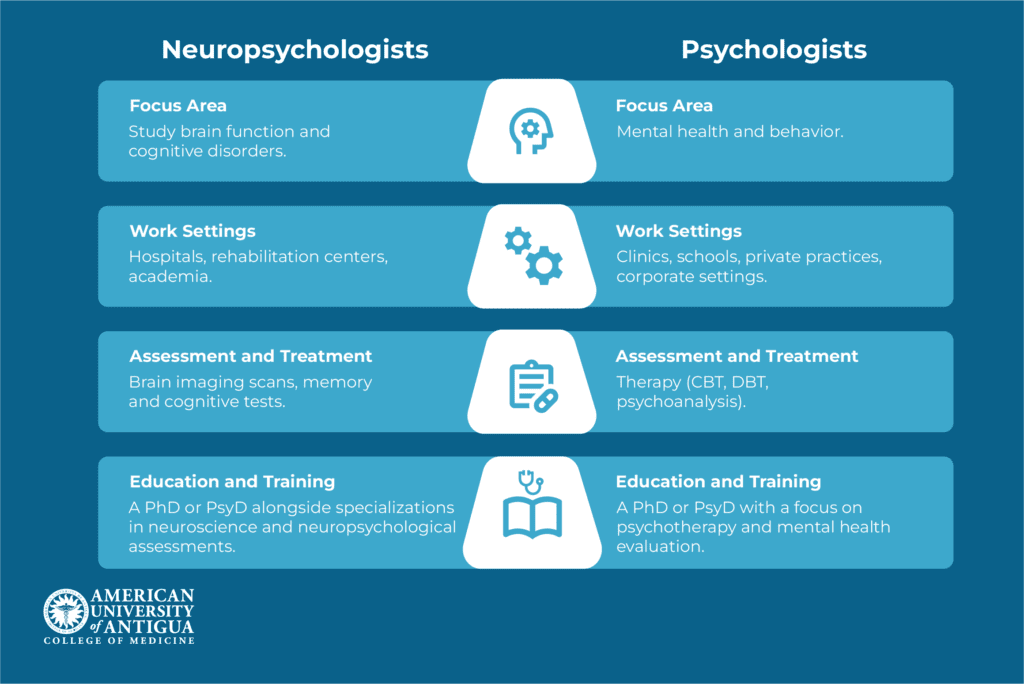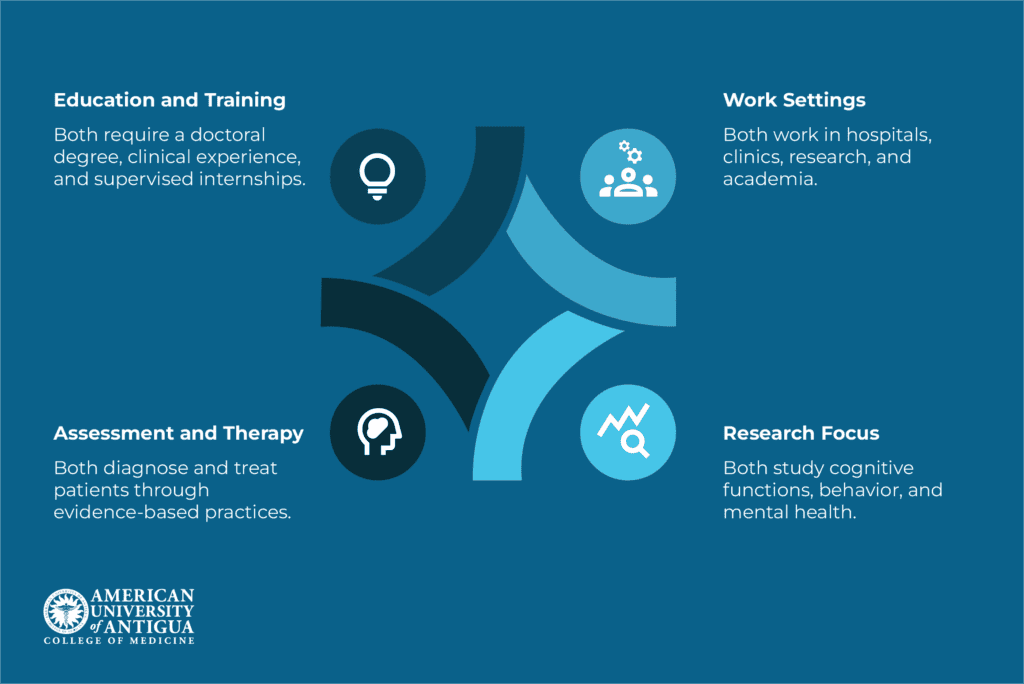Neuropsychologist vs Psychologist: Choose the Right Path
Key Takeaways
- Neuropsychologists specialize in brain function and cognitive disorders, while psychologists focus on mental health and emotional well-being.
- Both roles require a PhD or PsyD, clinical training, and supervised internships before obtaining licensure.
- Neuropsychologists use cognitive and neurological assessments, while psychologists conduct psychological evaluations, including personality and diagnostic tests.
Brain science is a complex yet important field of study. Although different specializations exist, neuropsychology and psychology are essential for comprehending human behavior and mental processes. Psychology broadly focuses on cognition, emotions, and behavior, while neuropsychology dives deeper into the relationship between brain function and behavior. Both areas are crucial for diagnosing and treating mental health issues.
Students considering a career in these fields must first understand the differences between them to make a well-informed decision. This article explores key differences between neuropsychologists and psychologists, including their educational requirements, responsibilities, and career opportunities.
✅ Request information on AUA's MD program TODAY!
YOUR PATH TO SUCCESS BEGINS HERE
Neuropsychologists vs Psychologists
Numerous specialties contribute to cognitive science by enhancing our understanding of the human mind, behavior, and mental health.
Neuropsychologists primarily examine how brain function influences behavior and may work with individuals who have neurological conditions. On the other hand, psychologists take a broader approach, studying thoughts, emotions, personality, motivation, development, and behavior.
Although both roles aim to improve mental well-being, they differ in their focus, methodologies, and expertise. The following sections will examine their distinctions in definitions and scope of work, job roles and environments, education and training paths, conditions they treat, assessment methods, and treatment approaches.

Definition and scope of work
Although neuropsychologists and psychologists work to understand human behavior and mental processes, their areas of focus differ significantly.
Neuropsychologists evaluate and treat cognitive impairments, brain injuries, and neurological disorders, examining their impact on memory, attention, problem-solving, and behavior. Their work is highly focused on the relationship between brain function and mental processes, often contributing to rehabilitation plans.
In contrast, psychologists specialize in emotional, behavioral, and mental health issues, addressing conditions such as anxiety, depression, and personality disorders through various therapeutic approaches.
Both roles have a shared goal of improving mental health. However, neuropsychologists emphasize the biological basis of behavior, while psychologists prioritize psychological and social factors affecting cognition and behavior.
Work environment and job roles
Neuropsychologists and psychologists work in various settings depending on their specialization and responsibilities.
Neuropsychologists typically work in hospitals, rehabilitation centers, research institutions, and specialized clinics. They assess the cognitive and behavioral effects of brain injuries, neurodegenerative diseases, and cognitive impairments. Neuropsychologists also collaborate with neurologists, neurosurgeons, and occupational therapists to develop comprehensive treatment and rehabilitation plans.
Psychologists, on the other hand, work in private practices, schools, mental health clinics, and corporate environments, focusing on emotional and behavioral issues through therapy and counseling. They also collaborate with psychiatrists, social workers, and educators to provide personalized, holistic care.
Both professionals conduct assessments. Neuropsychologists use cognitive and neurological tests to assess memory, attention, and executive functioning. In contrast, psychologists use psychological assessments to diagnose and address mental health conditions, personality traits, and emotional well-being.
Education and training
Becoming a neuropsychologist or psychologist requires extensive education and training, much like the rigorous path of medical school, despite differences in their areas of expertise. Both professions usually require obtaining a bachelor’s degree in psychology or related field, followed by graduate studies.
Neuropsychologists must complete a doctoral degree (a PhD or a PsyD) with a specialization in neuropsychology, neuroscience, and brain-behavior relationships. Their educational journey includes coursework in neuroanatomy, cognitive neuroscience, and neuropsychological assessments, along with clinical training in hospital or rehabilitation settings.
Similarly, psychologists pursue a doctoral degree in psychology, often specializing in clinical, counseling, or developmental psychology. Their training usually focuses on psychotherapy, psychological assessment, and research methods.
Both roles require supervised internships and postdoctoral training. However, neuropsychologists undergo additional specialized training in neuropsychological evaluations and interventions. Given their focus on complex brain-related disorders, neuropsychologists need a strong background in neuroscience to assess cognitive impairments and contribute to treatment planning effectively.
Treated conditions
Neuropsychologists and psychologists diagnose and manage various conditions, though their focus areas differ.
Neuropsychologists primarily address conditions rooted in brain dysfunction, assessing how neurological disorders affect cognitive processes and behavior. They use specialized tests to assess memory, attention, language, and executive functioning, developing tailored intervention strategies to support cognitive rehabilitation.
Neuropsychologists commonly work with individuals affected by:
- Traumatic brain injuries (TBIs)
- Dementia
- Alzheimer’s disease
- Stroke
- Epilepsy
- Multiple sclerosis
In contrast, psychologists specialize in mental health disorders related to emotional, behavioral, and cognitive patterns. Through psychotherapy, behavioral interventions, and counseling, they help individuals manage symptoms and improve overall well-being. Psychologists usually work with individuals struggling with conditions such as:
- Depression
- Anxiety
- Post-traumatic stress disorder (PTSD)
- Personality disorders
- Addiction
Testing and assessment methods
Neuropsychologists and psychologists rely on specialized testing and assessment methods to evaluate and manage different conditions.
Neuropsychologists primarily assess cognitive functioning and brain-behavior relationships. These evaluations typically include memory tests (e.g., Wechsler Memory Scale), executive functioning assessments (e.g., Wisconsin Card Sorting Test), and attention tests (e.g., Continuous Performance Test). Additionally, neuropsychologists may incorporate neuroimaging techniques, including MRI or CT scans, to identify structural abnormalities contributing to cognitive impairments.
Meanwhile, psychologists focus on assessing emotional, behavioral, and personality-related conditions. They usually use personality tests (e.g., Minnesota Multiphasic Personality Inventory), intelligence tests (e.g., Wechsler Adult Intelligence Scale), and diagnostic interviews to assess mental health conditions like anxiety, depression, and personality disorders. These methods allow psychologists to develop personalized treatment plans tailored to each individual’s needs.
Treatment methods
Neuropsychologists mainly focus on cognitive rehabilitation, behavioral interventions, and compensatory strategies to enable individuals to regain lost cognitive functions. They develop personalized rehabilitation plans for individuals with brain injuries, dementia, stroke, or neurological disorders.
Oftentimes, neuropsychologists collaborate with neurologists, occupational therapists, speech therapists, and other healthcare professionals to optimize patient outcomes. Their interventions may include:
- Memory training
- Exercises on executive functions
- Techniques that increase and develop attention and problem-solving skills
On the other hand, psychologists primarily use psychotherapy to address and manage emotional and behavioral issues. Common therapeutic approaches include:
- Cognitive-behavioral therapy (CBT)
- Dialectical behavior therapy (DBT)
- Gestalt therapy
- Psychoanalysis
- Humanistic therapy
- Counseling techniques
Therapy sessions focus on modifying negative thought patterns, developing positive coping mechanisms, and improving emotional regulation.
Psychiatrists complete medical training to become doctors and can prescribe medication, unlike neuropsychologists and psychologists. Psychologists can only refer patients to psychiatrists when medication is necessary alongside therapy. Meanwhile, neuropsychologists collaborate with medical professionals to address neurological conditions that require pharmacological treatment.
Similarities Between Neuropsychologists and Psychologists

Despite their differences, neuropsychologists and psychologists share similarities, including their education, training, and professional practice.
Both roles require a doctoral degree (a PhD or a PsyD), extensive clinical experience, and supervised internships before obtaining a license. Additionally, both neuropsychologists and psychologists conduct assessments to diagnose and treat individuals, though they focus on different areas.
Another common aspect of their work is therapy since both professionals use evidence-based practices to help patients manage their conditions, whether through cognitive rehabilitation or psychotherapy. Moreover, neuropsychologists and psychologists work in similar settings, including hospitals, clinics, research institutions, and academic environments.
Their research contributions may overlap, as both examine cognitive functions, behavioral processes, and mental health, aiming to enhance diagnostic and treatment approaches. Ultimately, neuropsychologists and psychologists are dedicated to helping individuals achieve healthier and more fulfilling lives by addressing their struggles and conditions.
How to Choose Between a Career in Neuropsychology vs Psychology?
Choosing between a career in neuropsychology or psychology requires you to carefully consider personal interests, overall requirements, and professional aspirations.
If you’re interested in helping individuals with brain injuries, neurodegenerative diseases, or cognitive impairments, neuropsychology may be your calling. Alternatively, if you’re passionate about therapeutic interventions or applying psychological principles to workplace environments, you may want to become an industrial-organizational psychologist or general psychologist.
Additionally, several factors should be taken into account before making your decision.
Education and training length
Neuropsychologists usually obtain a doctoral degree (PhD or PsyD) in clinical psychology, followed by postdoctoral training, which extends their educational path. On the other hand, some careers within general psychology may require only a master’s degree, though clinical psychologists still need a doctorate.
Pursuing a doctoral degree in either field involves significant financial investment, so students should explore tuition and financial aid options before starting their studies.
Work environment
Neuropsychologists typically work in hospitals, rehabilitation centers, research institutions, and specialized clinics. Psychologists can be found in different work environments, including private practices, schools, mental health clinics, hospitals, and corporate settings.
Salary and job demand
Due to their specialized expertise, neuropsychologists generally have higher earning potential than general psychologists. On average, neuropsychologists earn approximately $294,347 per year, while psychologists earn around $134,653.
Both fields offer strong job prospects, especially with the increasing awareness of mental health as a key component of overall well-being. According to the Bureau of Labor Statistics, the demand for psychologists, including neuropsychologists, is expected to increase by around 7% from 2023 to 2033.
Conclusion
Both neuropsychologists and psychologists contribute significantly to the field of brain science, each with unique training, approaches, and areas of expertise. Neuropsychologists specialize in working with individuals affected by brain injuries or neurological conditions. In contrast, psychologists address emotional, mental, and behavioral issues through therapy and counseling.
Your career choice depends on your interests, educational goals, and professional aspirations. Both fields offer financially rewarding careers, ample opportunities to impact lives, and significant contributions to research. Moreover, these career paths can serve as a foundation for those who want to pursue medical doctor (MD) programs to become a psychiatrist or neurologist.
If you want to take the next step in your healthcare career, the American University of Antigua College of Medicine (AUAMED) offers a comprehensive medical education, preparing students for careers in neuropsychology, psychology, or MD programs. Apply today and make your contributions to advancing mental health and brain science.
Frequently Asked Questions
Can a neuropsychologist be a psychologist?
Neuropsychologists are clinical psychologists who must undergo specialized training to assess and treat cognitive impairments resulting from brain injuries and neurological conditions.
Is a neuropsychologist a PsyD or PhD?
A neuropsychologist can hold either a PsyD or a PhD, depending on their area of focus and specialization within the field.
What can a neuropsychologist do that a clinical psychologist cannot?
Neuropsychologists specialize in assessing cognitive impairments resulting from brain injuries and neurological conditions. They use specialized neuropsychological tests and brain imaging scans to evaluate and address these conditions, while clinical psychologists typically focus on treating mental health issues through therapy and counseling.
✅ Request information on AUA's MD program TODAY!